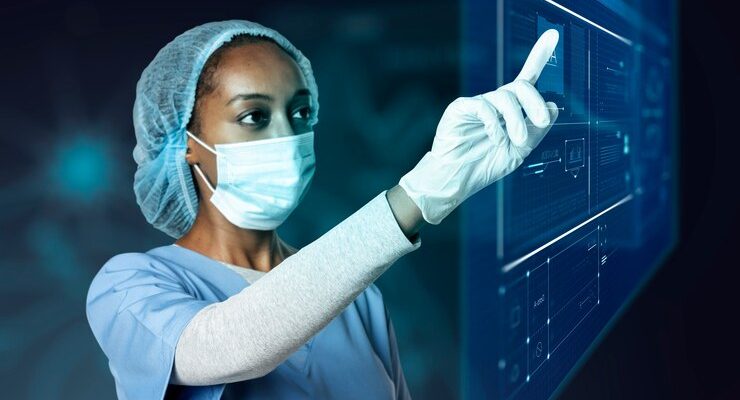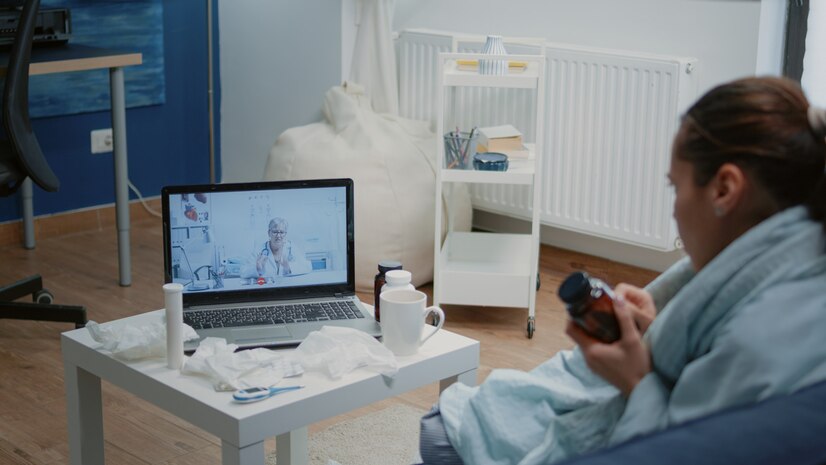
Technology has transformed all aspects of the way we live and work, and that especially includes the way health care is delivered. So, it stands to reason that the digital tools nurses now use have changed many aspects of their everyday roles and responsibilities.
Technological advancements have brought substantial improvements to patient care, including diagnosis and treatment. Also, people can now take more responsibility for their own health on a day-to-day basis thanks to wearable devices. Which is why it is estimated that healthcare apps for patients will reach an $8bn value in 2023 but will grow to an incredible $367bn value by 2028.
There are now amazing opportunities to improve your own health and beauty using mobile apps. You can track your fitness activities and cardiovascular health, manage your nutritional input, and even map your sleeping habits using smart watches and other wearable devices.
Self-managing your daily health using technology runs alongside huge steps forward in the devices, systems, and software that health care providers can now invest in. It is why nurses in various working environments have exciting new options for digital assessment and communication.
Do nurses need to be technologically minded?
Rapidly advancing healthcare technology leads to a need for nurses to be competent and confident in some of the basic principles of data collection and analysis, as well as ways to communicate and collaborate digitally.
A research paper in the British Medical Journal (BMJ) even called for there to be new “educational opportunities at undergraduate and graduate levels in informatics, digital health, co-design, implementation science, and data science” to enable nurses to embrace the digital age.
Educators from accredited institutions, such as Walsh University, have responded to this global development by making technology in nursing a primary focus of online qualification programs that support the various categories of nursing careers.
That means when you make nursing your first or second profession, you can take advantage of opportunities to develop technical skills that include the best use of the latest health care devices, software, and cloud systems.
Interestingly, courses like the one from Walsh University are another example of how technology has changed the face of nursing assessment and communication. You can now do a considerable amount of your nursing studies remotely and work around any existing job or family commitments.
Let’s explore more closely how technology has both underpinned and enhanced the important role nurses play throughout many different health and social care settings.
Remote health monitoring and alert systems

It is undoubtedly one of the most exciting ways that technology has changed the way health is monitored and managed by nurses and other health professionals. It is now possible for a patient with an existing condition to have their health status constantly measured and assessed.
It can be used for chronic health issues including diabetes, kidney function problems, and heart disease, for example.
Wearable technology and specialist devices can collect vital data around the clock and then notify the patient, nurse, or some other professional when a significant anomaly occurs. Or, the data can be used to create a diagnosis or to evaluate the success of a particular treatment plan.
Clearly, this enables RNs, LPNs, and other nursing professionals to assess and care for their patients in a more responsive and effective way.
Gathering accurate and relevant information
For nurses, technology that constantly reads and assesses a patient’s condition provides another crucial advantage. Previously, there was a heavy reliance on individuals giving an honest and accurate account of their symptoms and health challenges.
It could lead to someone downplaying or exaggerating their health issues. However, it could also lead to a skewed picture due to the fact that everyone’s pain and discomfort thresholds are different. Some people can cope with symptoms that others would find deeply worrying, or they may ignore crucial health warning signs for a multitude of reasons.
There’s less chance of someone being untruthful about their lifestyle choices if a medical device records that late-night trip to a burger joint or the hours spent sitting when they were supposed to be stretching and walking regularly!
Health status data generated from a medical monitoring device provides nurses with an accurate and factual assessment of the patient’s condition and any changes in that (positive or negative).
That could be especially important when the patient is incapacitated and can’t even begin to explain their symptoms or alert nurses to changes in their condition, such as a patient who is very ill or comatose. Modern medical technology enables nurses to monitor patients’ conditions far better when they can’t speak for themselves.
Automation and time saving
Having this technology available to monitor patients, including when they are at home or going about their daily lives, also provides another significant advantage to nurses and other healthcare professionals. Having the option to collect such comprehensive and relevant information using the latest devices and software saves time.
It can also mean the patient has to make fewer trips to clinics and hospitals for tests and checks, as their health status can be constantly under review.
More time is saved for nurses when the software and apps they use automate research, diagnosis, and some of their traditional tasks. They still need vital communication, critical thinking, and problem-solving skills, of course. That includes making firm decisions in often-critical situations. However, some of the more mundane decisions can be made by tried and trusted technology.
For example, meal trays and medications can be dispensed by modern robotic systems. There are even smart beds and automated equipment to transfer patients and carry out periodic tests. It reduces the need for nurses to do a lot of the lifting and walking that has presented a risk to their own musculoskeletal health.
The ability of technology to help nurses do things in a more streamlined and productive way goes further than that, though. They can also schedule appointments, cross-check treatments, and enlist additional medical expertise in minutes using their devices. That’s a time-saving advantage that could be lifesaving for nurses in critical care situations.
Communication with the patient
Technology has made it far easier for nurses to give patients accurate written information about their medications and other treatment recommendations.
Rather than relying on them to listen to instructions or read labels on packets and bottles, nurses can provide digital guidance to the patients that they can refer back to as often as needed. Also, digital messages and calendar entries could well mean that patients keep to their appointment and medication time slots and regular checks more reliably.
In addition, digital communication offers nurses more creative and effective ways to give patients inspiration and ideas for self-managing their health, for example, post-operative tasks following major surgery or post-partum activities for new mothers.
Having digital information to refer to and carefully worded reminders as messages can make a patient more inclined to take important steps forward in their recovery.
Electronic health records (EHR)
Having patient assessments and histories stored digitally enables nurses to accurately record a great deal of information seamlessly and efficiently. It then provides patients and other healthcare providers with detailed information that can be accessed and used in the future.
It is an electronic health record (EHR), and it is even enabling specialists to advise on medical conditions and procedures from anywhere in the world without necessarily seeing the patient in person.
Communication with colleagues
The above example is just one of the ways that technology has revolutionized the communication and collaboration opportunities that exist in healthcare. A nurse can consult with colleagues, specialists, and medical databases instantly, in real time, thanks to the devices and software that are now routinely used in many health and social care facilities.
Clearly, there are strict privacy controls and data user privileges to keep in mind in any health care organization. However, technology enables nurses to collaborate with colleagues in a far more proactive way compared to the days of having to track down the right person to talk to or doing largely verbal ‘handovers’.
Also, sharing information with patients’ families—in the appropriate situations—is much easier, thanks to the digital age. They can be kept informed and even video-chat in care meetings wherever they are in the world.
That was an especially poignant and crucial advantage during the COVID-19 pandemic, when families could talk to their loved ones virtually when a physical meeting was inadvisable.
The future, technology, and nursing
Of course, nothing will ever replace the compassion, care, and warmth of a dedicated nurse by your bedside, welcoming you to a clinic or visiting your home in a community nursing role.
However, technology and artificial intelligence look set to bring even more changes to the way health care is delivered in the coming years. It includes more uses of remote consulting and automated health care, using artificial intelligence to support these.
There are already ways to secure remote consultations and diagnoses, including real-time ‘examinations’ done by cameras and sensors. Virtual and augmented reality systems are also being used to map and explain a multitude of health conditions and treatments and enable patients to better understand and manage their own health.
The day is not far off when prosthetics and possibly even replacement organs will be produced by highly advanced 3D printing technology too. All adding more reasons why nurses need technology skills!
Read Also:











